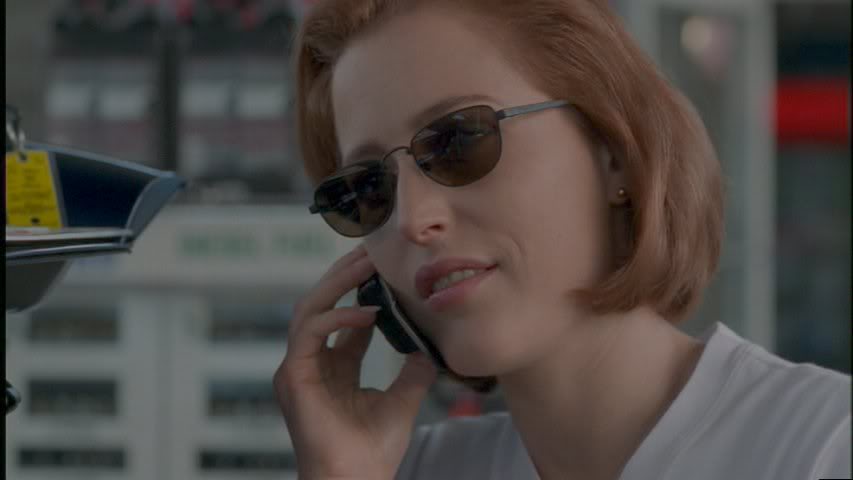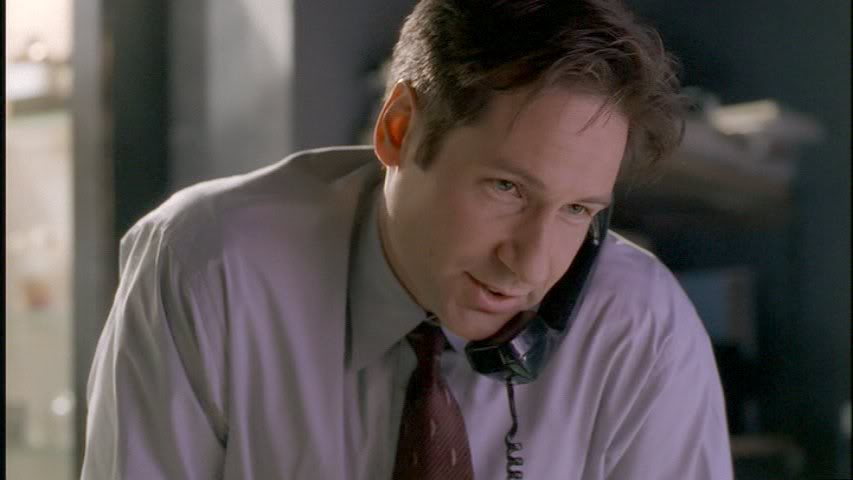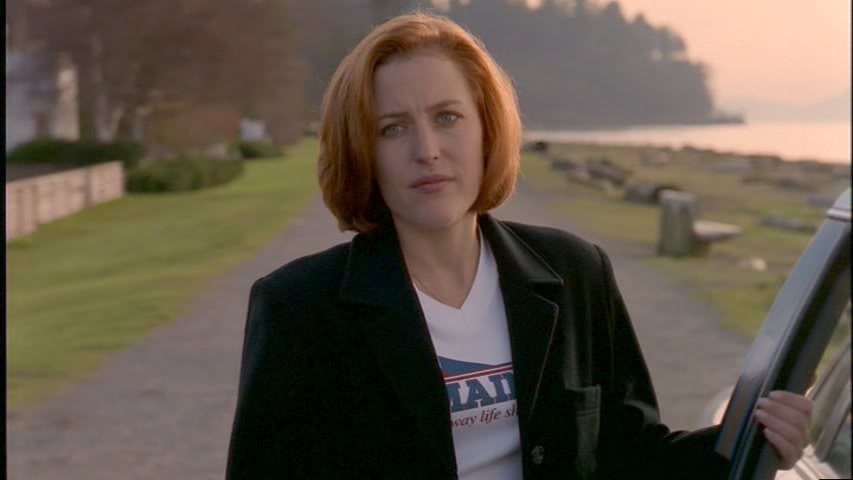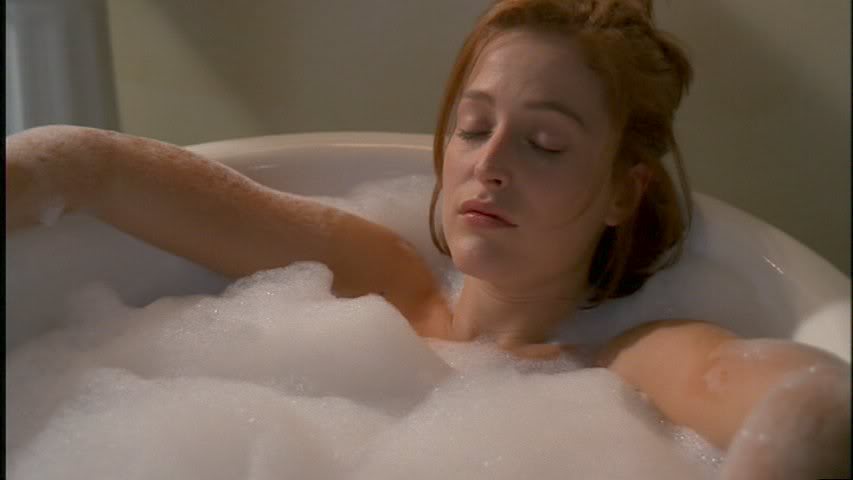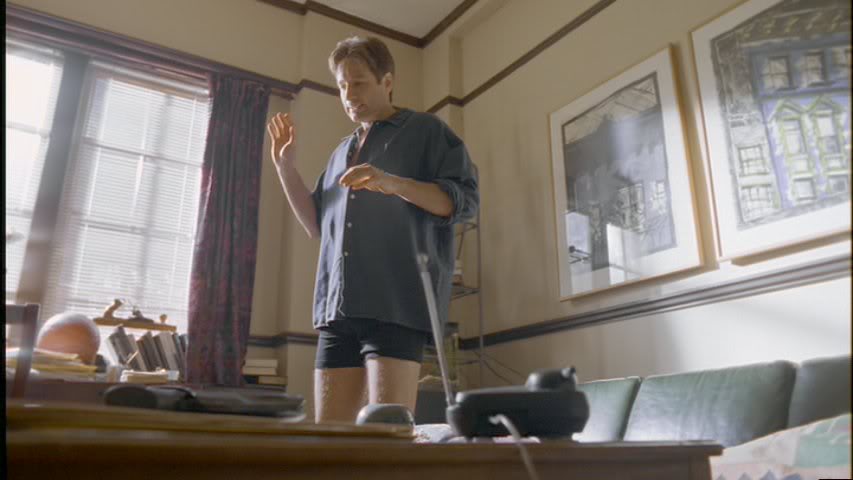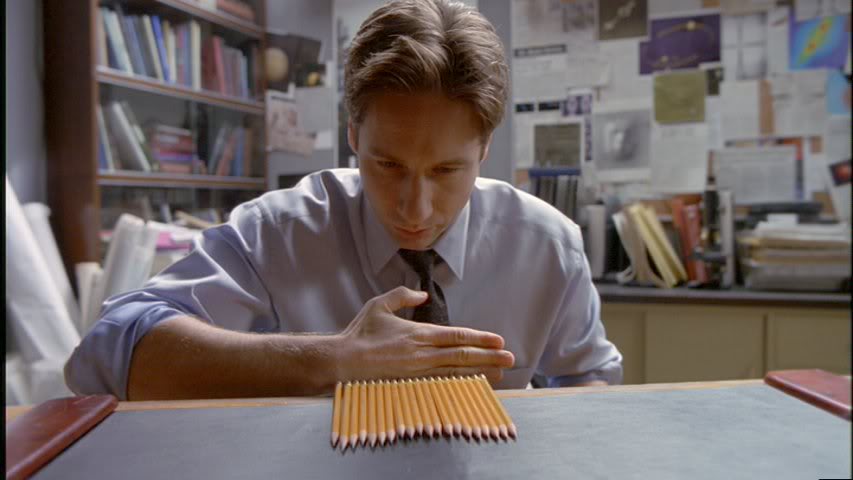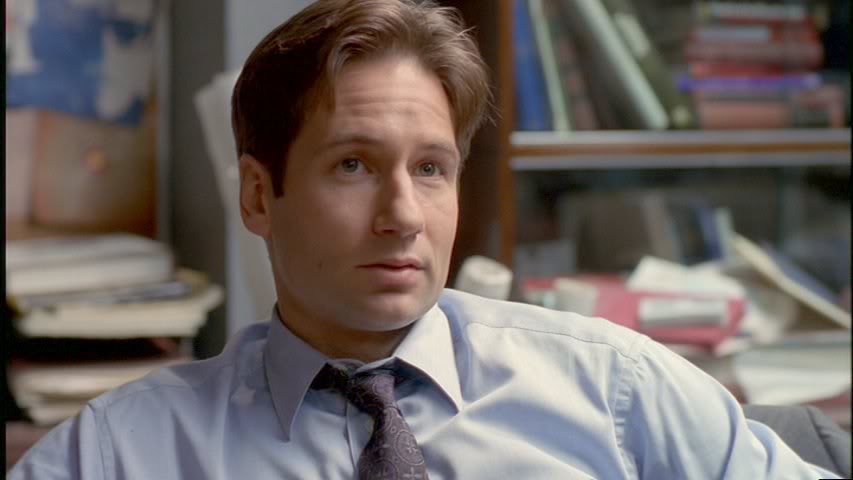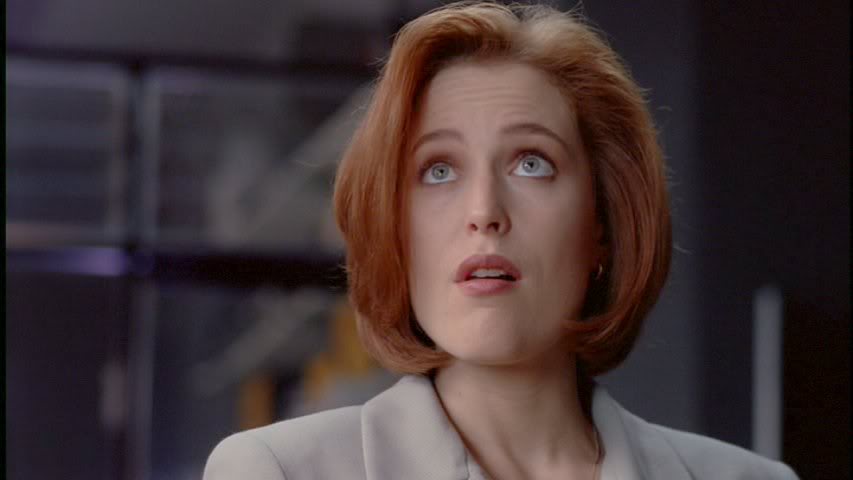CTP Episode of the Day - 09.05.06
Today's Cherished Episode: Chinga (5x10)
Original Air Date: February 8, 1998
Written By: Stephen King & Chris Carter
Directed By: Kim MannersWith the help of an eerie playmate, an autistic child is able to express her innermost feelings -- and terrorize an entire New England village.
S: No, I don't think it's witchcraft, Mulder, or sorcery. I've had a look around and I don't see any evidence that warrants that kind of suspicion.
M: Maybe you don't know what you're looking for.
S: Like evidence of conjury or the black arts or shamanism, divination, Wicca or any kind of pagan or neo-Pagan practice. Charms, cards, familiars, bloodstones, or hex signs or any of the ritual tableaux associated with the occult, Santeria, Voudoun, Macumba, or any high or low magic?
M: Scully ...
S: Yes?
M: Marry me.
S: I was hoping for something a little more helpful.Some "Chinga" Tidbits & Musings:
-- This episode was written by horror mega-author Stephen King and takes place in Maine -- King's home state (note Scully's "Maine - The Way Life Should Be" tee shirt) as well as the setting for many of his novels.
-- The title of this episode, in addition to being the name of Polly's doll (a fact that was never mentioned in the episode) is an extremely vulgar Spanish colloquialism, roughly equivalent to "the f-word" in Mexico -- something Stephen King was unaware of when he chose the name. (Apparently it means different things or nothing depending upon which type of Spanish you speak.) "Chinga" was also the name of a meteorite found in Siberia in 1913.
-- Reportedly, Fox made Chris Carter change the name of the episode after they discovered the "bad" nature of the word. Too late to change it as it aired in the USA and Canada, overseas the name was changed to "Bunghoney." Supposedly, Carter did not want to change the name, so he changed it to this perhaps equally distasteful but non-sensical word.
-- When word leaked out in 1997 that Stephen King had written an hour's worth of The X-Files,, many fans expected a horror story of one sort or another. What they got, most agree, was a perfectly presentable mid-season episode, containing, to be sure, several bizarre twists and turns; but no weirder, more convoluted, or problematic than usual. That was pretty much the view from behind the scenes, too.
-- "The whole thing started," explained Chris Carter, "back when Stephen met David Duchovny on Celebrity Jeopardy. He beat David, which was something we never let David live down. Stephen told David that he loved the show and that he would love to write an episode. Then one day, Stephen called me out of the blue. He said, 'Hey Chris, you know, I'd love to do a Millennium.' Which I thought was a little strange, considering what I'd heard, but he told me that he'd wanted to do an X-Files but then decided to do a Millennium instead. I said, 'Great!' Then he called back and said, 'I want to do an X-Files now. I've got some ideas.' So finally we took him up on his offer. Or actually, he took us up on his own offer. And every now and then I'd get another phone call from him, from his home in Maine. And then he did the episode."
-- Over the course of several months Chris Carter and Stephen King -- whom Carter never met in person -- wrote alternate drafts of the episode, with Carter turning out the final draft. Hence, they shared the writing credit.
-- "Stephen wasn't used to writing for Mulder and Scully," said Carter, "and the Mulder-and-Scully story in his original draft didn't quite work. The problem was, our stories have to track in a certain way. You can't get ahead of the lead characters. The viewers can't see things that they (Mulder and Scully) don't."
-- Carter also cut King's episode down to size and shifted the story primarily toward Scully by keeping Mulder at home in Washington. After that, the problems and subsequent improvisations weren't all that different from any other episode.
-- "'Chinga' was fun," said Gillian Anderson. "But the way the script originally read to me, initially it seemed to me as if Scully kind of stepped up to the plate and played along with the sheriff's humor in a way. So I ended up playing a lot of my lines a little ... well, not quite tongue in cheek, but just kind of falling into his rhythm. So in the end, I got a call from Chris saying, 'You know, there are people dying here. It's not funny. We have to edit out a lot of stuff.'"
-- Another problem -- creating an evil, enchanted doll different from the other evil, enchanted dolls the viewers had already seen -- was attacked by assembling Chinga from parts of several different dolls. On set, said props master Ken Hawryliw, Chinga was a stuntwoman with an oversized doll's head plopped on top; this was topped by "the world's largest wig" -- actually several wigs sewed together -- constructed under the supervision of hairstylist Anji Bemben.
-- Director Kim Manners gave the Chinga doll to the actress who played Polly, Jenny-Lynn Hutcheson.
-- In an interesting XF connection, Jenny-Lynn Hutcheson appeared in a 1998 TV movie, Nightmare Street, with Lauren Diewold, who played Scully's daughter "Emily" on The X-Files.
-- The Old Man's fishing boat was actually a beautifully pristine hobby fishing boat used as a pleasure craft by a local resident and "de-prettified" by construction supervisor Rob Maier (who got his start as an apprentice shipbuilder, learning how to build icebreakers) for use in the episode.
-- The name of the boat was "Working Girl" -- a reference to the movie of the same name in which David Duchovny made an appearance (as a partygoer).
-- A Maine accent is quite similar to a Canadian accent, said Vancouver casting director Coreen Mayrs, so finding Downeasters to populate Ammas Beach was not a problem.
-- The requisite wounds, slashes, and sharp-objects-in-the-eye-sockets were all in a day's work for special effects makeup artist Toby Lindala, who nevertheless appreciated the chance to create these classics for a Stephen King project.
-- Melissa Turner's premonitions of "Death Under Glass" -- including the sight of Dave the Butcher trapped in his freezer door -- were painstakingly created in post-production by visual effects supervisor Laurie Kallsen-George. She then tested them out by showing them to her two sons, age nine and eleven. "I gauge a lot of the shows by whether my kids can stand them or not," laughed Kallsen-George. "If they can't, I figure it succeeded -- and 'Chinga' bothered them a lot."
-- The scenes of Scully gassing up at a self-serve station were filmed at the self-serve gas station just across the street from The X-Files production office.
-- Oopsie! That probably explains why the gas station was charging Scully by the liter rather than by the gallon.
-- The supermarket scenes were filmed across town from the gas station, but in an actual supermarket, not a fake supermarket created from scratch. This was a first for The X-Files, according to art director Greg Loewen.
-- The timeline for this episode is up in the air. It was Christmas just three episodes earlier, but Scully is renting a convertible in Maine in February? Must have been a mild winter.
-- The classical music selection playing as Scully drives into town -- as well as during a later scene, when she takes her bubble bath -- was Hummel's Piano Concert No. 3, Opus 89.
-- An "interesting little issue" that the production crew had to deal with, according to Paul Rabwin, occurred during the scene when Scully was taking the bubble bath. "The scene called for Scully to kick the door closed with her foot," said Rabwin, but when she did, the camera picked up the "cute little tattoo that Gillian has on her ankle." Through "the magic of visual effects," Rabwin added, "that tattoo disappeared in the final shot -- we went in and painted it out."
-- The book Scully was reading was titled "Affirmations For Women Who Do Too Much."
-- Though Mulder tells Scully he was watching "World's Deadliest Swarms," the empty video cassette box on his desk was entitled, "Alien Probe."
-- But who needs "Alien Probe" when you've got Scully rattling off a list of witchcraft signs (see dialogue above). That did more to excite Mulder than any video he was watching! Scully might be the skeptic, but never let it be said that she doesn't do her homework (in the paranormal *and* in effective ways to excite Mulder < g >)!
-- The origins of the Hokey Pokey, a participation dance that became popular in the USA in the 1950s, are unclear. Larry LaPrise, Charles Macak, and Tafit Baker were granted the copyright for the song in 1950, and according to popular legend, they created the dance in 1949 as entertainment for the ski crowd at Idaho's Sun Valley resort. However, as the dance was wildly popular with American servicemen and Britons during World War II, that date cannot be correct. A different story states that Robert P. Degan and Joseph P. Brier, both natives of Scranton, Pennsylvania, wrote the original song (as confirmed by the U.S. Copyright Office in 1996), thus giving two groups of musicians the rights. Ray Anthony's big band recording of the song (the version used in the episode) turned it into a nationwide sensation by the mid-1950s (the "Hokey-Pokey" appeared on the B side of Anthony's "Bunny Hop" single). Its rights were purchased in the mid-1960s by country-western music star Roy Acuff's publishing company, Acuff-Rose. The song was humorously and existentially dealt with in Jimmy Buffett's song, "What If the Hokey Pokey Is All It Really Is About?" on his 2002 album "Far Side of the World." In the universe of Babylon 5, the Hokey Pokey apparently survived to the 23rd century, as it was referenced by Londo Mollari as "the one song that nearly all humans sing to their children at some point or another."
-- Oopsie! The map of Kentucky in Mulder's office was upside down.
-- When Scully asks Mulder if there are any references in occult literature to objects like dolls which have the power to direct human behavior, Mulder asks, "You mean like Chucky?" "Chucky" was the name of the Good Guy doll possessed by killer Charles Lee Ray in the 1988 horror movie Child's Play and its sequels. Chucky is voiced by Brad Dourif who played psychic killer Luther Lee Boggs in Season 1's "Beyond the Sea."
-- Susannah Hoffman (Melissa Turner) was most famous for her role as Anne's nemesis, Jen Pringle, in the sequel to the beloved Anne of Green Gables miniseries, Anne of Avonlea. She was 24 years old when she played the 14-year-old Jen. Hoffman is married to actor Maury Chaykin.
-- Tom Maddox's 16-year-old daughter appeared in this episode. Tom Maddox was the co-author of "Kill Switch," along with William Gibson. His daughter's appearance in the episode was a birthday gift from Chris Carter.
-- Sean Benbow played a customer in the supermarket; he was an office production assistant on the show.
-- Once & Future Retreads: Some Retread Champs in this one! Four-time retread Larry Musser (Jack Bonsaint) also played Sheriff John Oaks in "Die Hand Die Verletzt," Detective Manners in "Jose Chung's From Outer Space," and Denny Markham in "Unrequited." Five-time retread William MacDonald (Deputy Buddy Riggs) was also Dr. Oppenheim in "Fallen Angel," a Federal Marshall in "The Host," Agent Kazanjian in "2Shy," and Officer Trott in "Unruhe." Another four-time retread was Gordon Tipple (Assistant Manager) who was also a Detective in "Eve," Joe Crandall in "Young at Heart," and Hepcat Helm in "Humbug." Yet another four-time retread was Harrison Coe (Dave the Butcher) who was a government man in "Apocypha," Isaac Luria in "Kaddish," and the First Suit in "Unusual Suspects." Henry Beckman (Old Man) appeared as Detective Frank Briggs in "Squeeze" and "Tooms." (He'll always be Captain Clancy on Here Come the Brides to me!) Jenny-Lynn Hutcheson (Polly Turner) also played a little girl in "F. Emasculata" and Addie Sparks in "Paper Hearts." Carolyn Tweedle (Jane Froelich) was a day-room patient in "Elegy." Dean Wray (Rich Turner) was the tow-truck driver in "Oubliette." Ian Robison (Ranger) was Detective Smith in "Never Again."
-- In "Chinga," M&S proved once again that they sure do give good phone. This was basically the flip side of "War of the Coprophages" with Scully on the case (still unable to get out of her own head) and a bored and adrift Mulder unable to keep their agreement to "take the weekend off." Their last scene together is perfection, with both woefully transparent as they try to assert their independence from one another, Mulder talking about how much he got done without her and Scully pretending that she had a restful vacation with a guy named Jack. But like it or not, they're lost without each other, and in its own way, "Chinga" shows us that they not only need to be together, but they like to be together. And "that's what it's all about." < g >
(Thanks to chrisnu for today's pics.)
Please share your first impressions, favorite (or cringe-worthy) moments, classic lines, favorite fanfic, nagging questions, repeated viewing observations, etc., as today we celebrate "Chinga"!
By the way, just for the record, although I like popcorn, had a talking doll when I was a kid (anyone else remember Chatty Cathy?), and have been known to have done the hokey pokey once or twice in my lifetime, my pen name is not derived from this episode. My "Polly" moniker comes from that sweet little girl who likes to play glad games, wins a dolly at a carnival, and looks for the good in people (just as I try to look for the good in XF episodes and be glad for the things that the XF did give to me rather than worry about what it didn't).
But I'm not above saying, "Let's have fun!"
Polly
